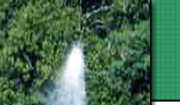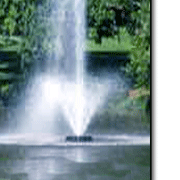Pond Fish
NOT ALL FISH ARE EQUAL
Your pond is a living ecosystem. An ecosystem in balance is
desirable. When it’s out of balance, problems occur. The
balance between prey and predator is an important consideration.
Sometimes, pond owners with the best intentions can cause themselves
serious problems. “We’d just dug a pond and we wanted
to see if fish would survive, so we put in couple dozen goldfish” – by
the time we hear this common complaint, the fish have been in
the pond for several seasons, two dozen fish have become thousands,
and the pond is a mess.
| Goldfish are carp and carp are very prolific.
If there are no predator species in the pond with them, carp
will
multiply unhindered. When they feed, carp love to dig up
the bottom of the pond, making the water murky. When a pond
is
over-populated, winter kill results, resulting in a putrid
mess of fish corpses in the spring. |
|
Other species to avoid are bullheads and catfish. They share
the carp’s indestructibility, and they’re equally
prolific. Bullheads and catfish also have a pectoral fin defense
mechanism, making them even harder to control with prey
fish.

|
Large mouth and
small mouth bass are becoming popular species in shallow,
warm ponds because they can tolerate warm water
and low-oxygen conditions. Although bass are relatively
expensive to purchase initially (two to three times the
price of
trout), they reproduce well. However, to thrive, bass need
an adequate number of prey species in the pond with them,
as well as a second predator species to keep the bass offspring
in check. Without the right balance of prey and predator
to regulate the food supply, bass will also over-populate,
resulting in a few large bass and thousands of stunted ones.
An over population of bass often results in winter kill.
|
| There are different trout species available
to suit different ponds. Trout, as a predator, can be used
to control many
undesirable species such as leeches, mosquitos and black
flies. Trout also respond favourably to commercial floating
trout food,
eliminating
the need for
prey
species.
Only in exceptional ponds will trout reproduce. This is a good
scenario as trout grow larger in size as opposed to more
in numbers. Remember the pond system can only support so
many fish or so many pounds of fish. |
 |
Maintaining the balance of your pond’s ecosystem does
not have to be difficult, but it does require educated management.
Bass, goldfish et al can over populate the pond’s stocking
capability resulting in serious problems. Before forging ahead,
you are well advised to contact your local fish farm or aquaculturalist
for information on species best
suited to your particular pond environment.
And a final word of caution: It is illegal to remove fish from
the wild and introduce them into your pond. One reason to honour
the prohibition is that wild fish may introduce disease, parasite,
leeches or other such undesirables into your pond.




